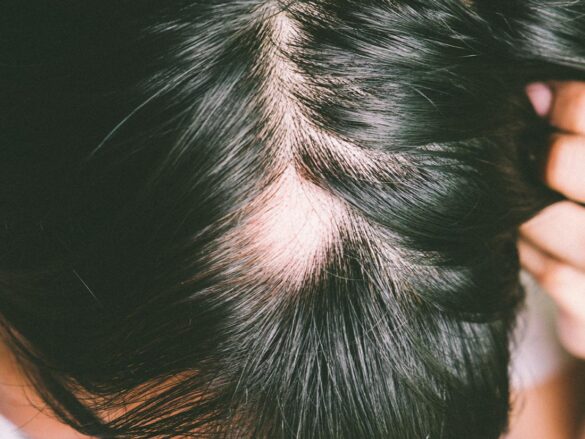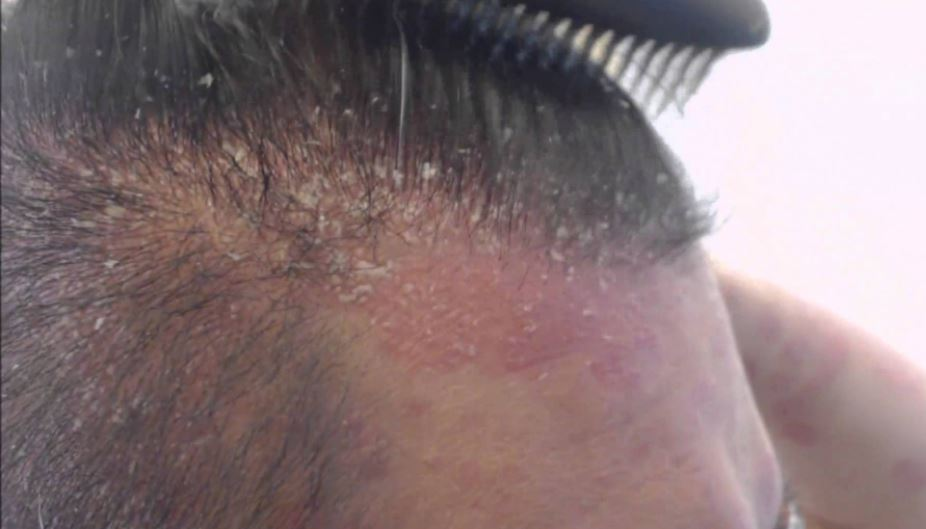Table Of Content

Lichen planopilaris is a condition that causes the scalp to become inflamed. Experts believe lichen planopilaris is the result of a weakened immune system. An can be caused by a number of factors and can be a symptom of an underlying medical condition. If using essential oils like rosemary or tea tree oil, add only a few drops, and dilute the oils with a carrier oil like olive oil or coconut oil. Look for one with specific scalp benefits like La Bonne Brosse, with boar bristles to distribute sebum along the length of the hair and a shock-absorbing cushion to care for the hair.
Psoriasis or Eczema

Actinic keratosis is a precancerous skin condition that happens after many years of sun exposure. If you get it on your scalp, it can make rough, scaly patches that might itch and feel dry. In fact, the patches can turn into certain types of skin cancer (like squamous cell carcinoma). If your skin tends to get dry when the seasons change, you might notice that your scalp is getting itchy and even flaky. Atopic dermatitis (eczema) is a skin chronic condition that can cause itchy inflammation on the scalp. It is caused by a combination of an overactive immune system, genetics, irritants in the environment like tobacco smoke, and stress.
When should dry scalp be treated by my healthcare provider?
Although reducing your stress levels might seem insurmountable, making sure you’re eating the right things will go a long way to setting a good foundation for optimum hair growth. A healthy balanced diet is also important in stress reduction too as it can support a healthy immune system, repair damaged cells and even reduce elevated cortisol levels. Getting enough protein in your diet is essential as it provides the building blocks for proper hair growth; meat, tofu, eggs, beans, grains, nuts, and fish are all good protein sources. Some studies suggest that telogen effluvium can also be connected to low levels of iron, so include iron-rich foods like leafy vegetables, lentils and liver where you can. If you like the idea of adding supplements to your routine, there are some which are specifically formulated to contain ingredients that increase hair thickness and health. Alopecia areata is an autoimmune condition that is characterized by “round patches of hair loss on the scalp,” although it can occur elsewhere on the body, Agbai says.
How to prevent psoriasis hair loss
It is often triggered or exacerbated by a psychologic or physical stressor and may be a manifestation of an underlying psychiatric issue or chronic pain syndrome. It is usually seen in elderly patients, and the key treatment is low-dose antidepressants, which Dr. Klein says can be life-changing for patients. Some small, limited studies have found that certain supplements and shampoos could be helpful, dermatologists say.
Causes of Hair Loss - How to Stop Hair Loss for Men - Men's Health
Causes of Hair Loss - How to Stop Hair Loss for Men.
Posted: Mon, 12 Feb 2018 08:00:00 GMT [source]

You can get it through direct contact with other people and animals. You can also get it by sharing objects, such as hats and brushes, and by touching surfaces that harbor the fungus. Tinea capitis can live for a long period of time on infected surfaces and objects. You’ve probably heard of people using some colloidal oatmeal to help soothe the itchiness from eczema. It’s finely ground oatmeal dissolved in water and forms a protective film over your skin, locking in moisture and preventing drying and flaking.
Braiding techniques that help avoid itchiness
But for more difficult cases, there are also handheld laser treatments and steroid injections available. To avoid picking or unintentionally scratching your scalp, keep your fingernails trimmed. Medications can treat autoimmune disorders and hormone disorders.
An itchy scalp can be irritating and even painful, depending on the cause. There can be several triggers, such as various forms of dermatitis or reactions to certain hair products. Psoriasis is an autoimmune condition characterised by dry, red patches covered in silvery scales. Scales of psoriasis can appear on the scalp and are frequently itchy. Scar tissue on the scalp can damage the nerve fibres in the skin, causing severe itching in some cases. Scar tissue that has formed due to a person's hair loss may cause itching.
Scalp Buildup: Causes + 8 Ways To Get Rid Of It & Why - mindbodygreen
Scalp Buildup: Causes + 8 Ways To Get Rid Of It & Why.
Posted: Thu, 09 Mar 2023 08:00:00 GMT [source]
Like ringworm, wearing a ponytail can cause both hair loss and scalp itching. Stick to looser styles, keep hair in tighter styles only for short periods, and vary your hairstyles throughout the week. Itchy scalps can be a symptom of many different conditions, from dandruff, to allergic reactions, to skin conditions. Whatever the cause, an itchy scalp can be frustrating and distracting, and make us self-conscious. Prescription medications, like finasteride (Propecia), may help prevent further androgenetic hair loss, especially for male pattern baldness.
IBS, colitis or Crohn’s? When to see a doctor about your stomach ache
A person can also apply natural oils, such as coconut oil, to the scalp before shampooing to help exfoliate the dead skin and flakes from the scalp. Conversely, some people with non-scarring alopecias, such as alopecia areata and androgenetic alopecia, experience itching or burning preceding the development of new patches of hair loss. Also known as ringworm of the scalp, tinea capitis is a fungal infection that penetrates deep into the hair shaft, causing itchiness and hair loss. Depending on the type of fungi responsible for the infection, the hair may break off at the scalp’s surface or just above, leaving hair stubs.
Using it on your scalp can help temporarily alleviate skin irritation and itchiness. If it’s not lice, you might wish it were when you learn about scabies, which according to Dr. Khatri can cause itching not just on the scalp but also on the entire body. Scabies on the scalp isn’t common, and it usually affects those with compromised immune systems. The most common cause of alopecia is an inherited condition called male- or female-pattern hair loss. Your doctor will prescribe the best course of treatment, but there are some additional natural or at-home remedies that you can try to help slow down hair loss or encourage hair regrowth. There are multiple other causes of itchy scalp not covered here.
Over-the-counter (OTC) medications generally consist of topical creams, gels, solutions, or foams that you apply directly to the scalp. The most common products contain an ingredient called minoxidil. However, the condition can be difficult to self-treat in some cases, and an itchy scalp can also be a sign of an underlying health concern.
Before pursuing hair loss treatment, talk with your doctor about the cause of your hair loss and treatment options. The shampoo contains 2% zinc pyrithione, an effective treatment for dandruff. According to the company, this product is suitable for people with dandruff and seborrheic dermatitis. People with ringworm may notice distinct patches of hair loss on the scalp.
Pimples on your scalp can have some of the same causes as pimples on the rest of your body, including sweat and beauty products. If you look closely, you can see tiny nits (eggs) attached to individual hair strands. They look a bit like dandruff, but they aren’t easily shaken off because they’re “glued” to the hair shaft. Adult lice move around the head, but they’re harder to spot than nits. A common offender is para-phenylenediamine, a chemical found in dark hair dyes and henna. But other products could be the source of your contact dermatitis, too.
Lichen planopilaris is an autoimmune disorder more commonly found women, usually presenting with itching, redness, burning, bumps, scaly skin, or even blisters. You might be tempted to try some home remedies you've read about on the Internet or seen on social media. However, there's no research evidence that things like vinegar rinses or athlete's foot products will help with dry scalp. The cause of psoriasis is not clear, but certain things may trigger a flare-up of the condition in some people, such as stress, skin injuries, infections, and cold weather. In severe cases, topical medications may not be strong enough to help with scalp eczema.
Scalp tenderness may include pain, inflammation, tingling, numbness, irritation, itching, throbbing, and stinging. “People can have a reaction to anything they put on their scalp—from shampoo to hair dye to Rogaine,” points out Dr. Haley. “And don’t forget about those hair-smoothing keratin treatments, adds Dr. Klein. If you have alopecia, you can help hold onto your tresses by avoiding behaviors that are known to contribute to temporary and permanent hair loss, Mirmirani says. A variety of treatments have been developed to help regrow hair and thicken existing hair on patients with alopecia, dermatologists say.
With an increase in inflammation, these skin cells pile on to each other, causing silver or red itchy plaques to form on your skin. You can get treatment for and eliminate the scalp conditions that occur due to infections. Medications that slow hair growth or regrow hair are somewhat successful, and wigs are always an option if medications are not effective in treating the scalp condition.

No comments:
Post a Comment